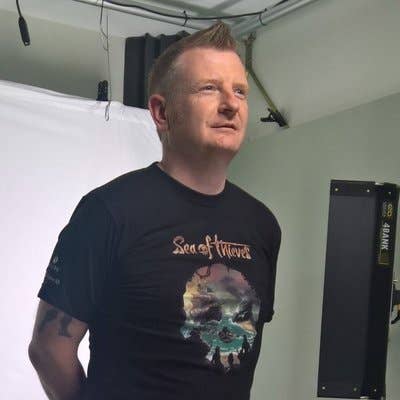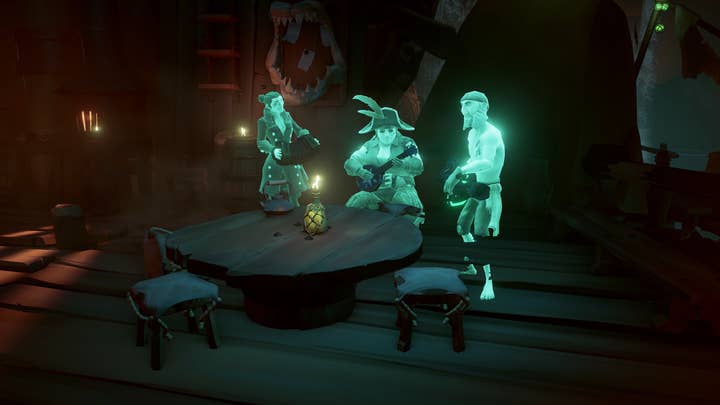Rare's voyage into uncharted waters with Sea of Thieves
Studio head Craig Duncan and executive producer Joe Neate discuss Rare's approach to its first service-based game
Emblazoned on the wall of reception at Rare's Twycross studio is a Sea of Thieves mural with the words "Players creating stories together". These four words have become the mantra around which Rare's world revolves, and the entire philosophy behind the development of its forthcoming pirate adventure.
It's been many years now since Rare, a studio renowned for producing stellar single-player experiences like Banjo-Kazooie, Conker's Bad Fur Day, and Viva Piñata, released a new IP. Sea of Thieves marks the dawn of a new era for Rare, not only as its first new property since 2010's Kinect Sports, but also as the studio's first foray into a co-operative multiplayer title operating on the games-as-a-service model.
For Rare, this journey has marked a culture shift at the heart of the company. It's moved away from its clandestine past, to actively including hundreds of thousands of fans in the development process via its Insider Program.

"Rare as a studio has notoriously been quite secretive," studio head Craig Duncan tells GamesIndustry.biz. "We'd pop a game out every few years like Willy Wonka's Chocolate Factory.
"We opened the doors now to what we were building and how we were building it. We were very open and transparent and very communicative on everything we were trying to do and why. I think genuinely gamers appreciate that and they want to be part of something."
This approach is important to Rare not just because of the nature of the game - the success of which could depend on how well Rare has been able to facilitate and encourage the emergent story and gameplay moments on which it relies - but also because Sea of Thieves is a completely new IP without the strong foundations of previous hits.
"One of the things we did very early on in this project was that we knew we'd need to build a new fanbase, a new community," says executive producer Joe Neate. "Yeah, we're Rare and some people are fans of Rare, but some people are just fans of Banjo, Conker, or Viva Pinata... you don't automatically bring those fans with you when you create something new, and Rare has always done very different things throughout its history. Sea of Thieves is a new IP, a new type of game, you need to earn the right to have fans for that.
“Rare as a studio has notoriously been quite secretive. We'd pop a game out every few years like Willy Wonka's Chocolate Factory"
Craig Duncan, Rare studio head
"So as you come toward the launch of the game and awareness grows... you've already got this very engaged group of people. They already understand the game, they understand the thinking behind it, they've watched all the videos and listened to all the podcasts; they help us educate everyone else who's coming in about what Sea of Thieves is, and they help people behave in that positive way.
"That was a strategy for us, to bring a new IP to market, we wanted to have all of the cards in our favour and so the Insider Programme gave us that. It means you're coming into the launch of a new IP almost with the community of a sequel."
This is where Sea of Thieves is uniquely placed to capitalise on the growing user-base of Twitch and YouTube. When the game first began production in 2014, the video streaming platforms didn't hold the same influence as today. From the outset though, Rare wanted to make a game that was fun to watch as it was to play. Therein lies the central conceit for Sea of Thieves, the vital importance of its emergent elements, and the 'magic' popularised by games like DayZ of which Neate and the team are so enthused.
"By making a game that's fun and emergent, and by giving people control over their journeys and experiences, you also encouraging creativity and imagination among players. It makes a game that's watchable and it makes a game that's really fun," he says. "They dovetail so nicely together.
"It's about what could we do to bring what's special about that type of stuff to a game that Rare would make... it's that magic, creating something that has great stories in it will automatically make it watchable and have players asking themselves what they can do in that world."
It's a strategy that appears to be working. During the recent closed beta, Sea of Thieves found itself among the most viewed games on Twitch, surpassing with ease the top-spot titles like Dota 2, League of Legends, and PlayerUnknown's Battlegrounds. That's an incredible amount of attention generated in a way that's markedly more impactful than any traditional advertising channels, but it's also only one piece of the puzzle.
“Sea of Thieves is a new IP, a new type of game, you need to earn the right to have fans for that"
Joe Neate, executive producer
According to Duncan, along with the full implementation of cross-platform play between the Xbox and PC, the recently announced Xbox Game Pass could play a significant role in securing success for Sea of Thieves. Describing it as "an incredible customer promise", he adopts the view that the more people with access to Sea of Thieves, the better, especially given its position as a new property.
"More players playing Sea of Thieves is a good thing, and that's the one-line version of my answer," he says. "However we get more people playing Sea of Thieves, that's a good thing. I think particularly with a new IP as well... that's really hard. Just getting people to understand it, for it to resonate, for it to cut through against established franchises. New IPs are super hard, if it was easy then everyone would do it."
Currently Rare stands in a strong position regarding the launch of Sea of Thieves. A well-respected studio bringing something truly unique to the table, a product that has generated a great deal of buzz, achieving widespread exposure across traditional media channels and influencers alike. But even considering all these elements, it'll matter for naught if Rare fails to deliver the game as an ongoing service, a challenge it's never faced before.
With the launch now just over a month away, the final Sea of Thieves package has been broadly defined, though as PC design lead Ted Timmins tells GamesIndustry.biz, it's far from complete and the road-map of updates stretches through into 2020.

"If we were talking about a more traditional game, like games I've worked on in the past, absolutely we'd have gone gold and everything would be locked down and manufacturing would be kicking off," says Timmins. "But given that we're a service, we're able to do the manufacturing part already for discs and boxes and that sort of thing, just under the knowledge that the week we come out, we'll release another update just like normal, and the week after another update, and the week after that.
"It's about us putting content in that will create player stories... We know, broadly speaking, what kind of big features we want to hit. But we also know it's hard to plan that far ahead, and we may find the community take to some things more than others, so we'll be relying on the data side of things quite heavily.
"We already know what we want to show at E3, what we want to show at Gamescom, and what we want to deliver for the holiday period. That's something we have to plan now."
When we think of games-as-a-service, we typically veer towards mobile titles like Clash of Clans, or free-to-play games like League of Legends, or even subscription-based MMOs like World of Warcraft. More recent and less conventional attempts like Star Wars Battlefront II have stumbled at the first hurdle, sowing seeds of distrust among consumers regarding monetisation in a full-price, AAA game.
With this in mind, Rare has considered its approach to long-term support and monetisation with care, ensuring to keep the community invested and involved throughout.
“It's about us putting content in that will create player stories… We know, broadly speaking, what kind of big features we want to hit”
Ted Timmins, PC design lead
"Obviously we're going to carry on what we've been doing to-date, which is working super closely with our community and being very honest and transparent about our plans, and being very genuine with our intentions because that's where it all starts," says Duncan. "Community and the people who play our games are the most important people to us and you've always got to remember that, whatever business you're in, whatever you do."
"We are obviously selling the base game. Then really as far as launch is concerned, as a new IP, the number one goal is to have a great launch experience... Beyond that, as any service-based game, the first couple of months we're going to be in listening mode, and react mode because with every large open-world, service-based game, there's going to be some issues. There will be some stuff that won't be balanced right, or some stuff that just having so many new players will show us seams we haven't even thought of."
For Rare, monetising Sea of Thieves in a responsible way is a genuine concern. As a game with entirely horizontal progression, the typical microtransactions in exchange for better in-game loot isn't even an option. Sea of Thieves is, first and foremost, a social game. It's even described by members of its community as a "friendship diving tool" so giving players an edge, even the ones willing to pay for it, is anathema to Rare's goals.
"We will add optional purchases at the point when adding the first major update to the game," says Neate. "We've thought long and hard about what's right for Sea of Thieves. For us, it's things that strengthen the fun and social side, so it's not things that affect power, it's not things that affect progression. Also if you're buying something in Sea of Thieves, you know what you're going to be buying, so it's not going to be loot boxes.
"Someone can buy it and they can bring it to the ship and the crew, but it adds fun for everyone. It doesn't have a mechanical value, it has an emotional value, and it just adds to the social nature of the game... it just feels like the right approach for us."
